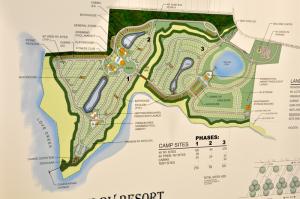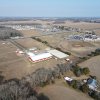A standing-room only audience crowded Sussex County Council chambers Feb. 19 to continue the ongoing debate surrounding a proposed RV resort and campground near Lewes.
At the top of the list are environmental and traffic concerns. Those issues – and many more – surfaced during more than four hours of testimony. Everything from rare frogs to the number of RV sites in the area was fair game, and the crowd listened to every word. The hearings are over; now the decision rests with county officials.
Jack Lingo Asset Management has two applications pending for Love Creek RV Resort and Campground off Cedar Grove Road between Lewes and Rehoboth Beach. The developer is asking for a conditional use and a zoning change from GR, general-residential district, to AR-1, agricultural residential, for 74 acres of the parcel. If approved, the entire 162-acre parcel would be zoned AR-1. Campgrounds are not prohibited in GR zones.
Included on the site plan are 628 camping sites: 516 for recreational vehicles, 30 for tents and another 82 sites for rental cabins. Proposed amenities are an amphitheater/chapel, welcome center, fitness center, laundry, clubhouse, general store, several pavilions and paddle boat launches, canoe outfitter, pumping station, swimming ponds, pools and RV storage. The plan has been modified twice based on comments from residents and an environmental expert.
Sussex County Council will vote on the applications following a recommendation from the county's planning and zoning commission.
Nick Hammonds, representing the developer, said, if approved, the project would be built in three phases with first phase construction in 2014 and a 2015 opening. Depending on demand, he said, additional phases would occur every two years, with most amenities and half the camping sites constructed during the first two phases.
Hammonds said there is a need for additional RV camping sites in the Cape Region, especially with the loss of more than 300 sites at the former Three Seasons campground near Rehoboth Beach. After a survey of the region, opponents said there are about 4,000 RV sites within a 20-mile radius and most parks have availability. The county recently approved 367 RV sites at Rehoboth Shores and another project with 575 sites being proposed near Massey's Landing, opponents noted.
Pros and cons of proposed project
Mary Schrider-Fox, representing several homeowners associations, said the proposed project may be outside the scope of the county's ordinance pertaining to campgrounds. She said cabins may not be permitted and several of the proposed amenities are not specifically listed in county code.
She said the parcel has been zoned for mixed-residential use, which would allow for some business and commercial development for the convenience of residents and farmers such as professional offices and light commercial.
“But this project is for the convenience of visitors only and for the convenience of the applicant as a commercial venture and not for the convenience of residents in the area,” she said.
Gene Bayard, the applicant's attorney, told council the decision can't be a popularity contest. He said many opponents live in The Retreat at Love Creek, a project that no one spoke in favor of when it was proposed. In fact, he said, because of its rural nature, the Delaware Department of Agriculture recommended denial of that project.
He said there was opposition when two other RV park applications surfaced: Three Seasons near Rehoboth Beach and a campground contained within Rehoboth Shores near Long Neck. Both were approved. The 320-lot Three Seasons, located near Rehoboth Beach Yacht and Country Club, recently sold for eight figures, Bayard said.
“This project will blend in with the area like every other RV park has,” he said.
Both sides call parcel unique
A critical issue for opponents if the impact impact the proposed RV resort would have on the environment. Both sides call the parcel unique, but for different reasons. Mostly wooded, the site borders Love Creek.
Opponents say the proposed project would scar the land forever. Retired National Park Ranger Hollis Provins of Lewes said the parcel would become sterile and attractive only to nuisance species. He said hydrological damage would mean the end to three rare species found on the parcel. “The unique and sensitive nature of the whole property will be lost if the proposed high-density development goes through,” Provins said.
Provins said Love Creek would be in jeopardy from campground runoff. He said gravel roads and parking pads would require herbicide weeding and mosquito control. In addition, he said, a large number of RVs would produce dripped fluids and gray water. “None of these additional pollutants should be allowed to drain into Love Creek or into the current freshwater habitat because of their potential to kill fish and wildlife,” he said.
Provins was one of several speakers from a coalition of homeowners who offered testimony against the applications.
The developer's representatives say buffers, limited tree cutting and minimal wetlands disturbance would maintain the ecological features of the parcel.
State environmental officials reiterated previous comments that the parcel is so unique that it should be preserved in its natural state. In a Jan. 25 letter from Department of Natural Resources and Environmental Control Secretary Collin O'Mara wrote to county officials: “The site includes an extremely rare and ecologically significant corridor of forestland, stream corridor wetlands, a very unique feature known as a coastal plain seasonal pond wetland and at least three animal species of concern. We strongly believe that this site is worthy of permanent protection.”
Furthermore, he wrote, DNREC would assist the landowner to preserve and manage the parcel.
Speaking on behalf of the developer, environmental consultant Ed Launay called the letter an overreach, pointing out that DNREC is one of the largest campground operators in the state, in locations just as environmentally sensitive as the parcel near Love Creek.
Launay said changes to the site plan were being made based on his assessment of the parcel. The major change is a larger buffer for Welches Pond, near the entrance of the proposed project, to create a preserved wildlife corridor. No trees would be removed from around the pond, and a tenting area near the pond would possibly be relocated. No access would be provided to the pond.
State environmental officials said the pond is home to three rare species: Eastern tiger salamander, barking treefrog and Cope's gray treefrog. All three species breed in the pond, which has both wet and dry periods, an essential habitat to all three species. The pond does not support fish.
“The species are rare in Delaware but globally secure,” Launay said. “In Delaware, they are on the outer range; that's one reason they are rare.”
Launay agreed with state officials that the site is unique, but he cited a different reason. He said because of the quick-draining soils, the parcel is a unique site for development. It also has a natural landing for access to Love Creek. Launay said the proposed project is also unique because it exceeds county standards for buffers and the site plan is laid out to avoid contact with tidal wetlands – the plan includes only one road crossing in non-tidal wetlands.
Launay said he counted 25 docks from the Love Creek bridge to Robinsonville Road in the area of the proposed project's kayak-canoe launch. “It's more than suitable for light recreational use,” he said.
Lawrence Lank, the county's director of planning and zoning, said his office has received 11 letters and emails in support of the project and 252 letters and emails and petitions with more than 800 signatures opposed to the project.
Next week: Roads and traffic.

























































